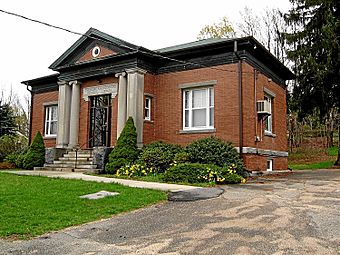Litchfield–South Roads Historic District facts for kids
Quick facts for kids |
|
|
Litchfield–South Roads Historic District
|
|

Hungerford Memorial Library
|
|
| Location | Roughly, Litchfield Rd. from Bridge Park to Harwinton Heights Rds. and South Rd. from Litchfield Rd. to South Cemetery, Harwinton, Connecticut |
|---|---|
| Area | 93 acres (38 ha) |
| Architect | Belkap & Webb; Dana, Richard Henry, et al |
| Architectural style | Colonial, Federal, Greek Revival |
| NRHP reference No. | 96001365 |
| Added to NRHP | December 6, 1996 |
The Litchfield–South Roads Historic District is a special area in Harwinton, Connecticut. It's like a time capsule that shows how the town center looked long ago. This district was settled in the 1700s. It grew around the main crossroads of Connecticut Route 4 and North and South Roads. Here, you can find many old homes, churches, and town buildings. Most of these buildings were built in the 1800s. This historic district was added to the National Register of Historic Places in 1996.
Contents
Exploring Harwinton's Past
The town of Harwinton began in 1737. Its land came from areas previously given to Hartford and Windsor. The town center grew where Route 4, a main east-west road, met the important local north-south roads. These are now called North and South Roads.
Harwinton's Early Economy
Harwinton remained a farming community throughout the 1800s. It did not become an industrial town. This was because it lacked railroad connections. It also did not have enough large rivers for factories.
New Homes in the Early 1900s
In the early 1900s, Harwinton saw a new trend. Like other towns in northwestern Connecticut, it became popular for city people to build second homes here. One such person was William McConway from Pittsburgh, Pennsylvania. He had beautiful stone walls built along South Road.
What You'll See in the District
The historic district is shaped like a "T". It runs along Route 4 (Litchfield Road and Burlington Road). It also extends south along South Road. Most of the buildings are homes. They are spread out with plenty of space between them.
There are four churches in the district. You can also find the site of the town's first cemetery here. The original meetinghouse, which was like a town hall and church, was right in the central crossroads. Most buildings in the district are from the 1800s. However, the library, with its classic design, is from the early 1900s. The Congregational Church is a newer version of an old church that burned down in 1949. Only the Roman Catholic church complex at the west end has modern buildings.
 | Delilah Pierce |
 | Gordon Parks |
 | Augusta Savage |
 | Charles Ethan Porter |



